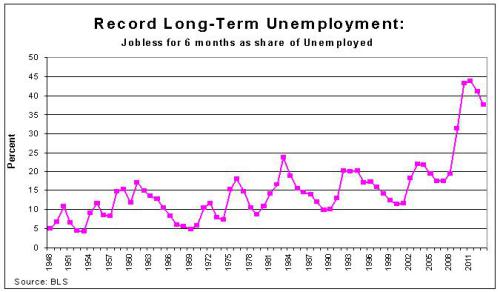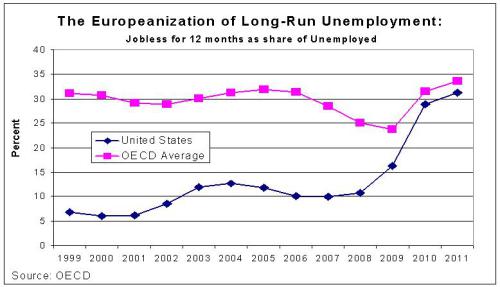Looking at labor markets, my biggest concern is the drop in labor force participation.
The data from the Labor Department on the employment-population ratio, for instance, suggest a permanent reduction in the share of the population that is working.
And since economic output and living standards ultimately depend on the quality and quantity of labor and capital that is being productively utilized, it obviously is not good news that millions of people are no longer employed.
But if I had to identify a second-biggest concern, it would be the “Europeanization” of long-run unemployment in the United States. Specifically, we have a growing problem of too many people being unemployed for long periods.
I pontificate about this issue in a column for CNN.
…there are almost 4 million Americans who have been out of work for more than six months. That’s a big number. What’s disconcerting is that the current long-term unemployment is more serious than in previous economic downturns. Data from previous business cycles show people suffering from long-run joblessness at worst accounted for about 20% to 25% of the unemployed. In recent months, that percentage has jumped to nearly 40% — an all-time record! Indeed, America is beginning to look like Europe. It used to be that long-term unemployment in the U.S. was only a fraction of Europe’s, but the latest data from the Organization for Economic Cooperation and Development show that the United States has caught up to many of Europe’s welfare states. That’s not a race we want to be part of, much less win.
Here are some charts that illustrate the severity of the problem.
Let’s start with a look at what’s happened over time in the United States.

As you can see, the problem of long-run unemployment rises and falls with the business cycle. But during previous recessions, the share of the unemployed who were out of work for more than six months rarely climbed above 20 percent. And then the problem quickly got better once the economy began to recover.
That’s no longer the case. Long-term unemployment peaked at more than 40 percent of overall joblessness between 2010 and 2012. And even though we’ve supposedly been in a recovery since the summer of 2009, that number has fallen to only about 37 percent.
Now let’s compare the data from the United States to the numbers from other developed nations. As you can see, the United States used to have a huge advantage over other industrialized countries, but that gap has almost completely disappeared.

We don’t know, to be sure, whether this represents a permanent change. But my concern is that we’re more and more likely to see bad European-type numbers now that we’re enduring European-type economic policies of bigger government and more intervention.
There is an alternative, which I explained in my CNN column, that could improve American labor markets.
…what’s the solution? There’s no silver bullet, but economic growth is the single most important key. …Unfortunately, …we’re still suffering through a sluggish economic cycle. Recent improvements in the overall employment rate are in large part the result of people dropping out of the labor force, and the problem of long-run unemployment has barely budged. To boost employment, we need the kind of strong growth America enjoyed during the Reagan and Clinton years, when millions of new jobs were created and the unemployment rate fell dramatically. To get there, we need a return to the types of free-market policies we got under Reagan and Clinton: a lower burden of government spending and less intervention from Washington.
Seems simple, right? We got good growth and job numbers during the Reagan and Clinton years, so we should replicate those policies.
But that hasn’t been the case. And the problem didn’t start with Obama, though he’s certainly made it worse.
…we’ve been moving in the exact opposite direction. Under both Presidents Bush and Obama, the size and scope of government has expanded, and the United States — which had the world’s third-most free-market economy when Bill Clinton left office — has now dropped to 17th in the Economic Freedom of the World rankings. We also need to make sure the unemployed don’t get lured into long-term dependency. One glaring example of misguided big-government policy is the argument to endlessly extend unemployment benefits. …Moreover, Obama’s proposed hike in the minimum wage…is the equivalent of sawing off the bottom rungs on the economic ladder. Simply stated, businesses create jobs when they think a new employee will help the bottom line. Artificially raising the cost of workers — particularly those with marginal skills — is a recipe for creating more unemployment.
I hate repeating myself, but it bears saying over and over again that the key to prosperity is small government and free markets.
But to the extent we become more like France and less like Hong Kong, we are doomed to get anemic economic performance and fall in the competitiveness rankings.
